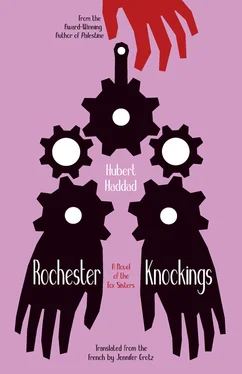From time to time Margaret wrote her long rowdy missives where she cursed everyone on Earth, starting with Leah who gave herself the right to reprimand Margaret publicly in the name of the spiritualist cause, under the pretext that she was giving herself over to alcohol and, in a series of degradations, to the disloyal charlatans of French and German spiritualists touring Main Street America and the entire East Coast. It was apparent from her letters, without her daring to admit it, that her manager and probably lover Franck Strechen was exploiting her with the cynicism of a pimp or circus-freak showman. Kate sadly felt very glad while reading of no longer having to deal with that spiritual brotherhood, in some respects as fratricidal as it was incestuous, and of having preserved her twins and her husband from the miasmas of the other world, for she no longer had any doubt that frequenting the dead too often meant giving oneself over to them body and soul. George who, in marrying her, had lost Mr. Coleman as his client, was half-ruined but not unhappy to distance his beloved wife from the crowds, more and more numerous, applauding her in their grief from the wars, catastrophes and epidemics that traditional faiths were no longer able to console. Such dangerous heresy was in his opinion more contagious than gangrene.
It was a fact that neither Mr. Coleman nor Charles Livermore, warned belatedly of her defection, were interested any longer in her since her marriage: a woman of family goes better with stoves than spirits. The only company Kate had were George, her children, and her family-in-law. Uncle Herbert visited them once a week, always jovial, so happy to play the great uncle that the twins, delighted at this diversion, celebrated him like one of the Magi. Gifts accumulated in their room, all different: little islands of toys would have sufficed to betray Arcady and John Elias if the illness had not long shut down their mimetic emulation. Although he was a radical atheist, admirer of the Paris Commune and great reader of Karl Marx, starting with his Contribution to the Critique of Political Economy, Uncle Herbert kept the former pythoness of the pedestal table in relative mistrust. He had learned never to judge individuals on their alienation and treated his sister-in-law with the same distant charity that Plague doctors must have had in the time of the miasma theories. Once a month a less amiable grandmother came up, a jealous widow who monopolized the attention of her son and grandsons at Kate’s expense, suspicious in her eyes of casting a spell. Wasn’t she one of the three Fox sisters, like the three Gorgons with snakes for hair, like the Fates or the monstrous Grey Nuns of legend who had among the three of them a single eye and one lone tooth, taking turns watching and devouring?
Kate was never happier than in the fisherman’s house they rented sometimes in the summer, at Gower, between the beaches and cliffs of Wales, when the lawyer could accompany the children. It was upon returning from a week on the peninsula that his health problems, up until then inconsequential, took a dramatic turn. After having gone valiantly to his office in the city with the help of his coachman, several days later, swearing that it was only a little fatigue, George took to his bed and died one summer night in 1881, in the sole company of his wife, to whom he had never stopped promising that it was really nothing serious, that he would go on loving her for many more years and even more once he felt better.
Alone in the house, the children entrusted that night to their grandmother, Kate shook the body of her husband while begging him to respond, screaming at him that it wasn’t funny, that he had never ever abandoned her, then wept her fill on his already cold hands, kissed his lips and eyes, and suddenly petrified by the evidence, searched her empty mind to remember a prayer from her childhood. After a silence that lasted nearly an hour, she stammered the creed of John Wesley she’d so often read, chiseled on the pediment of the Methodist church in Hydesville:
Do all the good you can
By all the means you can
In all the ways you can
In all the places you can
At all the times you can
To all the people you can
As long as ever you can
VI.The Two Widows of Notting Hill
At nine years old, nothing about the schemes of adults escapes you. This is what Arcady and John Elias told each other without saying a word on the return home from the cemetery. They conversed and thought by exchanged glances. Needless to bother with words, unless for putting on airs. Silence isn’t just for the deaf.
Uncle Herbert, grandmother, all sorts of aunts and old cousins had invaded the apartment after the funeral as if to hide a secret or to take the place of their father. And then those people went home, leaving the house full of shadows. Kate would come to tuck them into their twin beds and, very solemn, tell them stories of blessing and paradise, but she would cry a long chain of iron tears. And it was they, the children, who night after night had to console her. Explain to her that he was there, close by, that George was watching them with his different colored eyes, one blue eye in this world, the green eye in the other.
Weeks later, a thundering night in autumn, Kate started to smile prettily, like Mary of the Images. She promised them a surprise: Margaret, their aunt, was going to cross the Ocean to come meet them. One more relative or one less, this piece of news was fleeting, but Katie’s smile kept up its promise. Arcady and John Elias, for months now, had listened to her lessons of healing while she herself had been using both hands to hold open her own wounds. One night very late, she led them into the room where their father had been laid in his coffin. There was a table with three chairs, just across from the bed illumined by a bedside candelabra. “Who is there?” asked Kate, after having them sit down, their little hands flat on the table. It was winter, an enormous gust shook the roofs and chimneys in a torrent of noise. Sometimes a gust charged with rain seemed to cross the exterior wall. Then the alphabet started to answer Kate’s voice with numbers and the table knocked the floor from one foot or another: one, two, three, four, five. . Was it five? The numbers had to be translated back into letters and words in order, then she read:
A-R-C-A-D-Y-J-O-H-N-E-L–I-A-S-I–L-O-V-E-Y-O-U.
Was that all? They already suspected that their father loved them. Although this game without any playing cards was fun, with the candles, the agitated table and those mysterious noises, their eyelids were heavier than the earth on a grave. Kate had to carry them one after the other up to bed. Another time, the table rose, oscillating like a little hot-air balloon. Arcady could not believe that his father, once so reasonable, was returning from the grave for such mischievous turns. John Elias was of the same opinion and, without either one of them expressing such a thing, declared all of a sudden:
“Mister Splitfoot, will you soon finish with your antics!”
Kate, horrified, stood straight up, letting the table topple. “Who told you about him?” she stammered.
The twins, side by side, looked at their mother with the unusual attention one gives to a loved one confessing to a defect or hidden perversion.
“You did, Mommy!” said Arcady, “when you sleepwalk at night through the rooms. .”
“My boys, my boys!” she cried, incapable of finding the salutary words, clutching their heads to her chest.
It was by telephone, from the central post office, that Kate made contact with her sister who, just arrived at the port of London, was calling from the offices of the maritime shipping company at the agreed upon day and time. Yes, there was no change, they were expecting her at the indicated address, she was still living with her children in their Notting Hill apartment. Kate wasn’t surprised by the hoarse and listless voice on the other end of the line, thinking of the hardships of that voyage.
Читать дальше












